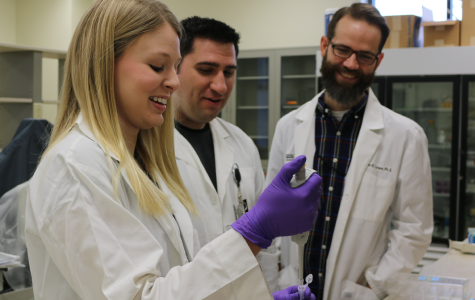NIH, DOD Award Grants to Abilene Cancer Researcher

Devin Lowe, Ph.D.
In the context of wound healing, angiogenesis is a good thing. In fact, angiogenesis is crucial to wound treatment because it helps generate new connective tissue and microscopic blood vessels that are required for tissue remodeling during healing. However, angiogenesis also has a down side: It is a major process by which benign tumors develop into malignant ones.
It is the down side of angiogenesis, as it relates to cancer treatment, that Devin Lowe, Ph.D., is investigating. Simply put, he is looking for ways to inhibit angiogenesis in tumors.
“I am a tumor immunologist by training,” Lowe said. “My entire world-view is that the immune system can be appropriately utilized to prevent/destroy tumor growth. This concept has already been clinically validated by FDA-approved immunotherapeutic strategies that work to defeat cancer. So, my motivation is to continue to do the types of research necessary to better understand the immune system—in relation to cancer—so that we can improve patients’ long-term responses to cancer immunotherapy.”
To help in his research, Lowe, an assistant professor for TTUHSC’s Department of Immunotherapeutics and Biotechnology in Abilene, recently landed a pair of three-year grants. The first, from the National Institutes of Health (NIH), is a $453,039 R15 grant for research titled, “Immunotherapeutic Targeting Of Colon Cancer Vascularization To Achieve Long-Term Protective Immunity.” The second, a $542,982 Department of Defense (DOD) grant, is for research titled, “Immunotherapeutic Targeting Of Colon Cancer Vascularization To Achieve Long-Term Immunity Against Primary And Metastatic Disease.”
Though from different agencies, Lowe said both grants are funding distinct projects aimed at better understanding the interactions between immune cells and tumor-derived blood vessels within the colon cancer microenvironment. This knowledge will allow scientists like Lowe to develop more effective immunotherapies for ultimate clinical trial evaluation.

Lowe with students in the lab.
“In the case of the NIH R15 grant, the long-term goals are to develop antibody-based therapeutics that can be administered to patients,” Lowe explained. “The DOD grant will allow us to study the utility of targeting colon cancer growth and spread using listeria-based vaccines.”
Like any tissue in the body, Lowe said cancer cells need blood vessels for growth and expansion. Ultimately, his team’s research strategy is to stunt tumor growth indirectly by targeting and destroying tumor-derived blood vessels.
“We are essentially knocking out the foundation from the house,” Lowe added. “Our efforts also apply to other vascularized cancers such as melanoma since our immunotherapeutic strategies targeting tumor-derived blood vessels work across cancer types.”
Lowe’s research team includes Amanda Wooster, graduate student Trevor Anderson and assistant professor Laurence Wood, Ph.D., one of Lowe’s department colleagues in Abilene.
“Amanda and Trevor are diligently working on both of these projects,” Lowe said. “Dr.
Wood is a collaborator on the DOD grant; his expertise in listeria-based vaccines
is critical to the success of the grant.” ![]()
Related Stories
Celebrating Veterans: TTUHSC’s General Martin Clay’s Legacy of Service and Leadership
From his initial enlistment in the Army National Guard 36 years ago to his leadership in military and civilian health care management roles, Major General Martin Clay’s career has been shaped by adaptability, mission focus and service to others.
Texas Tech University Health Sciences Center School of Nursing Named Best Accelerated Bachelor of Science in Nursing Program in Texas
The TTUHSC School of Nursing Accelerated Bachelor of Science in Nursing (BSN) program has been ranked the No. 1 accelerated nursing program in Texas by RegisteredNursing.org.
TTUHSC Names New Regional Dean for the School of Nursing
Louise Rice, DNP, RN, has been named regional dean of the TTUHSC School of Nursing on the Amarillo campus.
Recent Stories
The John Wayne Cancer Foundation Surgical Oncology Fellowship Program at Texas Tech University Health Sciences Center Announced
TTUHSC is collaborating with the John Wayne Cancer Foundation and has established the Big Cure Endowment, which supports the university’s efforts to reduce cancer incidence and increase survivability of people in rural and underserved areas.
TTUHSC Receives $1 Million Gift from Amarillo National Bank to Expand and Enhance Pediatric Care in the Panhandle
TTUHSC School of Medicine leaders accepted a $1 million philanthropic gift from Amarillo National Bank on Tuesday (Feb. 10), marking a transformational investment in pediatric care for the Texas Panhandle.
Texas Tech University Health Sciences Center Permian Basin Announces Pediatric Residency Program Gift
TTUHSC Permian Basin, along with the Permian Strategic Partnership and the Scharbauer Foundation, Feb. 5 announced a gift that will fund a new pediatric residency.
